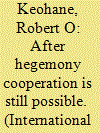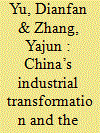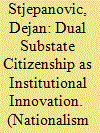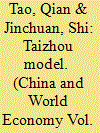| Srl | Item |
| 1 |
ID:
142888


|
|
|
|
|
| Summary/Abstract |
This paper, which appeared in The International Spectator in January 1984, previewed many of the themes of my book, After Hegemony: Cooperation and Discord in the World Political Economy.1 I argued that the US had lost its hegemonic position in the world political economy: the ability to make and enforce the rules. Furthermore, its “egoism” would lead it to be less willing to invest in leadership or influence. Nevertheless, I argued, it was possible for cooperation to persist without hegemony – a major theme of my book, in response to others who argued that the collapse of American hegemony would usher in a new era of conflict.
|
|
|
|
|
|
|
|
|
|
|
|
|
|
|
|
| 2 |
ID:
143556


|
|
|
|
|
| Summary/Abstract |
China’s industrial transformation faces four big roadblocks: the loss of traditional comparative advantage, weak domestic demand, low-end locking of the value chain, and structural and institutional obstacles. The shift of economic growth to structural upgrades, innovation and a service-based economy is the primary driving force required. China should implement four strategies. The first is to cultivate a new dynamic comparative advantage and inject new vitality for industrial transformation. The second is to let the market play a more decisive role and establish a long-term mechanism to expand domestic demand. The third is to promote the convergent development of global and national value chains, upgrading the value chain in horizontal and vertical axes. The fourth is to create an upgraded version of Chinese reform, manage the market with a pattern of negative listing and supervise the government with a pattern of positive listing.
|
|
|
|
|
|
|
|
|
|
|
|
|
|
|
|
| 3 |
ID:
142483


|
|
|
|
|
| Summary/Abstract |
This article analyzes the politics and constitutional position of the Brčko District of BiH, drawing on this case to inform several important debates in the field with regards to questions of federalism, citizenship, and electoral politics. The article shows that the condominium logic of territorial arrangement has profound implications for substate citizenship in Brčko. It argues that apart from territorial options and consociational institutional mechanisms substate citizenship is an important element of conflict management. Though often neglected in the literature, dual substate citizenship could be considered an instrument of conflict management and, as this article argues, as a model of institutional innovation in divided societies.
|
|
|
|
|
|
|
|
|
|
|
|
|
|
|
|
| 4 |
ID:
081900


|
|
|
|
|
| Publication |
2008.
|
| Summary/Abstract |
Based on the case of Taizhou City in Zhejiang Province, the present paper investigates the mechanism of the interaction between the local government and private enterprise in the process of regional economic development. We identify the "Taizhou Model" as a model of institutional innovation and the development of private economy, which is private sector-induced and local government-promoted Indeed, the impact of such mechanisms has had a significant influence on the reforms and development of China s economic system.
|
|
|
|
|
|
|
|
|
|
|
|
|
|
|
|
| 5 |
ID:
114855


|
|
|
|
|
| Publication |
2012.
|
| Summary/Abstract |
This article examines the profound transformation market reforms have brought to the leadership of the Chinese Communist Party's (CCP) rural grassroots organizations. Focusing on the political rise of private entrepreneurs and other economically successful individuals who recently obtained village Party secretary appointments in a north China county, the article explores their differing promotion channels, power bases, political resources and motivations to take up the CCP's grassroots leadership position. It demonstrates that the variety among the new entrepreneurial Party secretaries - from large factory owners to de facto farm managers - shaped the network resource, factional affiliation and socio-political capital they rely upon to exercise their newly attained power. It also shows the crucial role played by community-based endogenous forces in transmitting the power of economic liberalization into dynamics for the reshuffling of the Communist Party leadership at the grassroots level.
|
|
|
|
|
|
|
|
|
|
|
|
|
|
|
|
| 6 |
ID:
106952


|
|
|
|
|
| Publication |
2011.
|
| Summary/Abstract |
This short comment seeks to clarify what unipolar politics as usual is, and how it differs from politics as usual under alternative systemic conditions, especially bipolarity. This is an assessment 'from within', accepting Brooks and Wohlforth's description of unipolar politics as well as their central premises that America's lonely superpower status faces no immediate threat and that there is little evidence that powerful states are actively seeking to overthrow the current unipolar system. I suggest that a comparative assessment of how alternative distributions of power create different incentive structures for states yields different conclusions and policy prescriptions than those advanced by Brooks and Wohlforth. Most notably, Brooks and Wohlforth do not fully appreciate how the 'unipolar politics as usual' that they describe provides states with few incentives to cooperate with their policy prescription that the US reshape the world's institutional architecture.
|
|
|
|
|
|
|
|
|
|
|
|
|
|
|
|